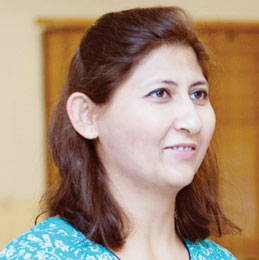SCITECH
Last year over 40,000 visitors came to the first TDF Magnifi-Science Exhobition which included students from schools all over Karachi. Leading corporations and organizations made exhibits and dioramas that explained their respective work. Also scientists, educationists, environmentalists and entrepreneurs shared their ideas with visitors and young enthusiasts.
 The exhibition is bigger this time. It is based on four main themes: Basic Sciences, Science of Technology, Earth Sciences and Health Sciences; there are more participants, and a lot more activities. Prestigious names like Engro Corp, Hubco, Siemens Pakistan,ÊK Electric and General Electric are all participating in this daring and exciting project. Us spoke to Sabrina Dawood, CEO The Dawood Foundation (TDF), about this innovative project...
The exhibition is bigger this time. It is based on four main themes: Basic Sciences, Science of Technology, Earth Sciences and Health Sciences; there are more participants, and a lot more activities. Prestigious names like Engro Corp, Hubco, Siemens Pakistan,ÊK Electric and General Electric are all participating in this daring and exciting project. Us spoke to Sabrina Dawood, CEO The Dawood Foundation (TDF), about this innovative project...
“The Exhibition aspires youngsters and adults to delve into the scientific world. It provides a platform to the children and teachers to implement the same learning and methods in their schools, colleges and universities,” shared Sabrina Dawood.
“Pakistan is in the state of an education emergency already. Our public schools are getting worse with time and private schools are under pressure from the government to reduce fees, which will compromise the quality of education. The point of concern here is that Pakistan lacks scientists in the country.
“Only 2 percent of our GDP is used in Research and Development. This has led to severe shortage of students who want to pursue science as their main subject. Another serious issue is the quota system.
“Moreover, we do not encourage children to ask questions and do not give them a chance to critically analyze the issues pertaining to current situations. According to the Euro-Asia report, 60 percent students take interest in science after visiting a science museum. Unfortunately, primary and secondary students in Pakistan lack such chances. According to a report by Alif Ailaan, the learning level of students in Sindh, in 2013-14, for Science and Maths is on an average 17-18 percent whereas Karachi itself saw a drastic decline in science scores from 24 percent in 2013 to 17 percent in 2014. This deteriorating interest towards science signifies a lack of interest in students to pursue science at later stages of higher education. This consequently leads to a scarcity of specialists for industrial and economic development.”
TDF has been promoting education since 1960. Their first initiative, Dawood University, was undertaken to produce engineers and technology specialists. Other established institutes include Dawood Public School, KSBL, Mariam Dawood School of visual arts and design amongst others.
In Dawood’s opinion, “Informal learning spaces should be increased in the country. STEM is also a good concept to incorporate in the learning system; STEM education integrates concepts that are usually taught as separate subjects in different classes and emphasizes the application of knowledge to real-life situations.
“There are numerous fields of engineering and science that can be taught in a simpler manner through vocational training centers. We do understand the importance of this and are planning to start vocational training soon.”
Speaking about Magnifi-Science, Dawood explains, “As of now it is limited to Karachi. Fortunately, other cities are following the trend as well. Khwarizmi Science Society in Lahore arranged a science mela last year. Also, a science summer camp was held by the KP government in 2016. We are glad that others are also taking up the initiative to promote critical thinking amongst students.”